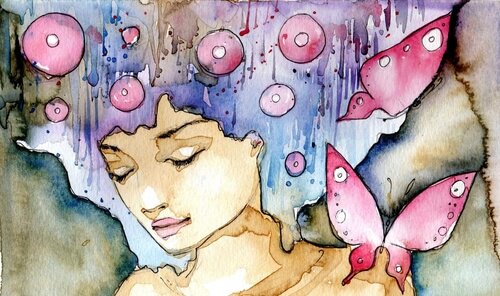Your Way Of Thinking Defines Your Feelings

We are thinking and feeling beings. Our way of thinking determines what we feel, and we take what we think as a sign of truth. Thinking is an incredible ability, but it can also play bad tricks on us.
“According to how we speak to ourselves, we will live in one way or another and the world we perceive will be one way or another.”
-Óscar González-
Which comes first: thought, emotion, or feeling?
In order to respond to this question, we first have to briefly define three concepts:
- Thought: The ability that people have to form ideas and representations of reality in their mind.
- Emotion: Psychophysiological and biological expressions; expression of mental states.
- Feeling: Mood or emotional disposition towards a thing, fact, or person.
There is a fine line between our ability to think and our ability to feel, and our emotions are the link between the two.
In our daily lives we often talk about these three concepts as if they were synonyms, but the fact of the matter is that thinking, experiencing emotions, and feeling are very different things.

We are rational beings. But this does not imply that emotions and feelings are foreign to us. They play an important role in our personality, our way of interpreting the world, the decisions we make, and the way that we come up with our ideas.
We pay attention to our emotions and this is a human ability that we must not push out of our lives. Reason without emotion or feeling has no purpose.
Feelings are more long lasting than emotions, but emotions are more intense than feelings
It’s important we learn how they work inside of us: that relationship is fundamental for promoting our emotional intelligence, our way of relating to ourselves and with others, and ultimately in improving our mental health.
Emotions are associated with a person’s personality and motivation. Emotions have a shorter duration than feelings and they are what motivates us to act. They are more intense than feelings, but they do not last as long.
Feeling comes from the verb “feel” and refers to an affective mood, generally a long-lasting one, which appears in the subject as the product of their emotions. Feelings are the result of emotions.
Let us look at an example:
I am practicing yoga. It is an activity that I like doing and that makes me feel good. I have been practicing for a while and it has been a learning process during which I have had good days and bad days.
It is true that, in an objective way, my performance in the activity has been improving at a good pace; I am able to do postures that I originally had the feeling would be impossible.
Yesterday I went to a class again and it was one of those days when my activity gave little result. I did not manage to carry out the postures that I could previously do without a problem and that seemed to have become fixed in my memory and in my activity as a yoga student.
My thought said: “I am a mess, this is not for me”
My emotion told me: “I am mad at myself”
My subsequent feeling the rest of the day was: “I feel sad, depressed, disheartened”

Which one do I pay attention to?
In the previous example, the way in which we analyze the situation will determine what opinion I have of myself, the motivation I have to keep going to classes, and my attitude.
If I think that I am a mess, does this possibly mean that I am one just because of one time that I could not do the exercise? Does it mean that I am a mess just because of one bad movement? Maybe learning is not made up of trial and error?
If my emotion is anger, does this mean that if I am mad at myself, what I am thinking becomes more true? Could that emotion really be telling me something true about who I am? Does feeling an emotion confirm what we think?
If I feel sad at the end of the day, does it mean that it was really that important for me? Maybe everything we feel is true? Is a feeling the fruit of what I think?
Here is the key to everything: Not everything that we think is true, emotions often do not confirm what we are thinking, and not everything that we feel means that it is true.
What can we do to get better?
When you notice yourself saying, “If I feel like that, then it is true that…” find out the automatic thought that comes along with the emotion you are feeling and ask yourself, “What did I think to make me feel that way? Do I have proof to believe that things are always like this?”
It is a matter of questioning ourselves and reflecting so that we do not believe the stories that we tell ourselves from time to time.
We are thinking and feeling beings. Our way of thinking determines what we feel, and we take what we think as a sign of truth. Thinking is an incredible ability, but it can also play bad tricks on us.
“According to how we speak to ourselves, we will live in one way or another and the world we perceive will be one way or another.”
-Óscar González-
Which comes first: thought, emotion, or feeling?
In order to respond to this question, we first have to briefly define three concepts:
- Thought: The ability that people have to form ideas and representations of reality in their mind.
- Emotion: Psychophysiological and biological expressions; expression of mental states.
- Feeling: Mood or emotional disposition towards a thing, fact, or person.
There is a fine line between our ability to think and our ability to feel, and our emotions are the link between the two.
In our daily lives we often talk about these three concepts as if they were synonyms, but the fact of the matter is that thinking, experiencing emotions, and feeling are very different things.

We are rational beings. But this does not imply that emotions and feelings are foreign to us. They play an important role in our personality, our way of interpreting the world, the decisions we make, and the way that we come up with our ideas.
We pay attention to our emotions and this is a human ability that we must not push out of our lives. Reason without emotion or feeling has no purpose.
Feelings are more long lasting than emotions, but emotions are more intense than feelings
It’s important we learn how they work inside of us: that relationship is fundamental for promoting our emotional intelligence, our way of relating to ourselves and with others, and ultimately in improving our mental health.
Emotions are associated with a person’s personality and motivation. Emotions have a shorter duration than feelings and they are what motivates us to act. They are more intense than feelings, but they do not last as long.
Feeling comes from the verb “feel” and refers to an affective mood, generally a long-lasting one, which appears in the subject as the product of their emotions. Feelings are the result of emotions.
Let us look at an example:
I am practicing yoga. It is an activity that I like doing and that makes me feel good. I have been practicing for a while and it has been a learning process during which I have had good days and bad days.
It is true that, in an objective way, my performance in the activity has been improving at a good pace; I am able to do postures that I originally had the feeling would be impossible.
Yesterday I went to a class again and it was one of those days when my activity gave little result. I did not manage to carry out the postures that I could previously do without a problem and that seemed to have become fixed in my memory and in my activity as a yoga student.
My thought said: “I am a mess, this is not for me”
My emotion told me: “I am mad at myself”
My subsequent feeling the rest of the day was: “I feel sad, depressed, disheartened”

Which one do I pay attention to?
In the previous example, the way in which we analyze the situation will determine what opinion I have of myself, the motivation I have to keep going to classes, and my attitude.
If I think that I am a mess, does this possibly mean that I am one just because of one time that I could not do the exercise? Does it mean that I am a mess just because of one bad movement? Maybe learning is not made up of trial and error?
If my emotion is anger, does this mean that if I am mad at myself, what I am thinking becomes more true? Could that emotion really be telling me something true about who I am? Does feeling an emotion confirm what we think?
If I feel sad at the end of the day, does it mean that it was really that important for me? Maybe everything we feel is true? Is a feeling the fruit of what I think?
Here is the key to everything: Not everything that we think is true, emotions often do not confirm what we are thinking, and not everything that we feel means that it is true.
What can we do to get better?
When you notice yourself saying, “If I feel like that, then it is true that…” find out the automatic thought that comes along with the emotion you are feeling and ask yourself, “What did I think to make me feel that way? Do I have proof to believe that things are always like this?”
It is a matter of questioning ourselves and reflecting so that we do not believe the stories that we tell ourselves from time to time.
This text is provided for informational purposes only and does not replace consultation with a professional. If in doubt, consult your specialist.







